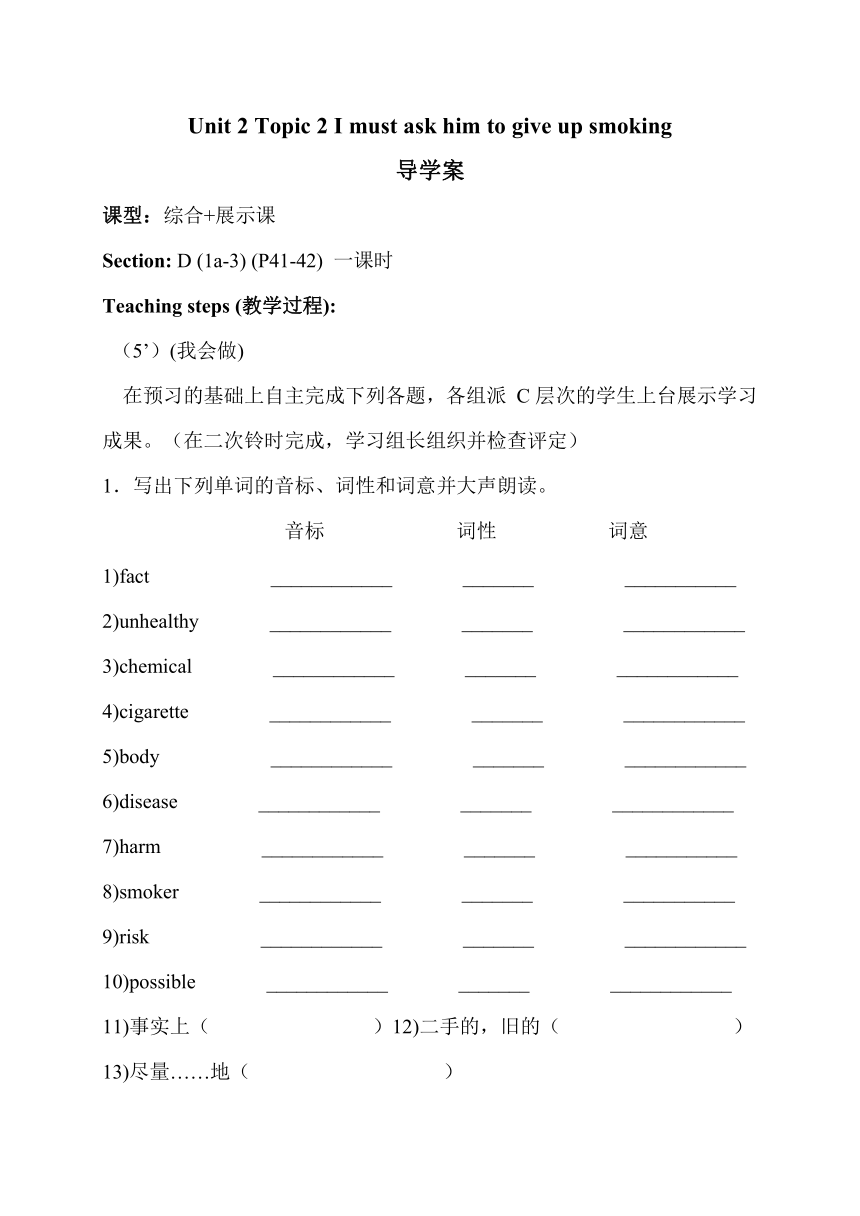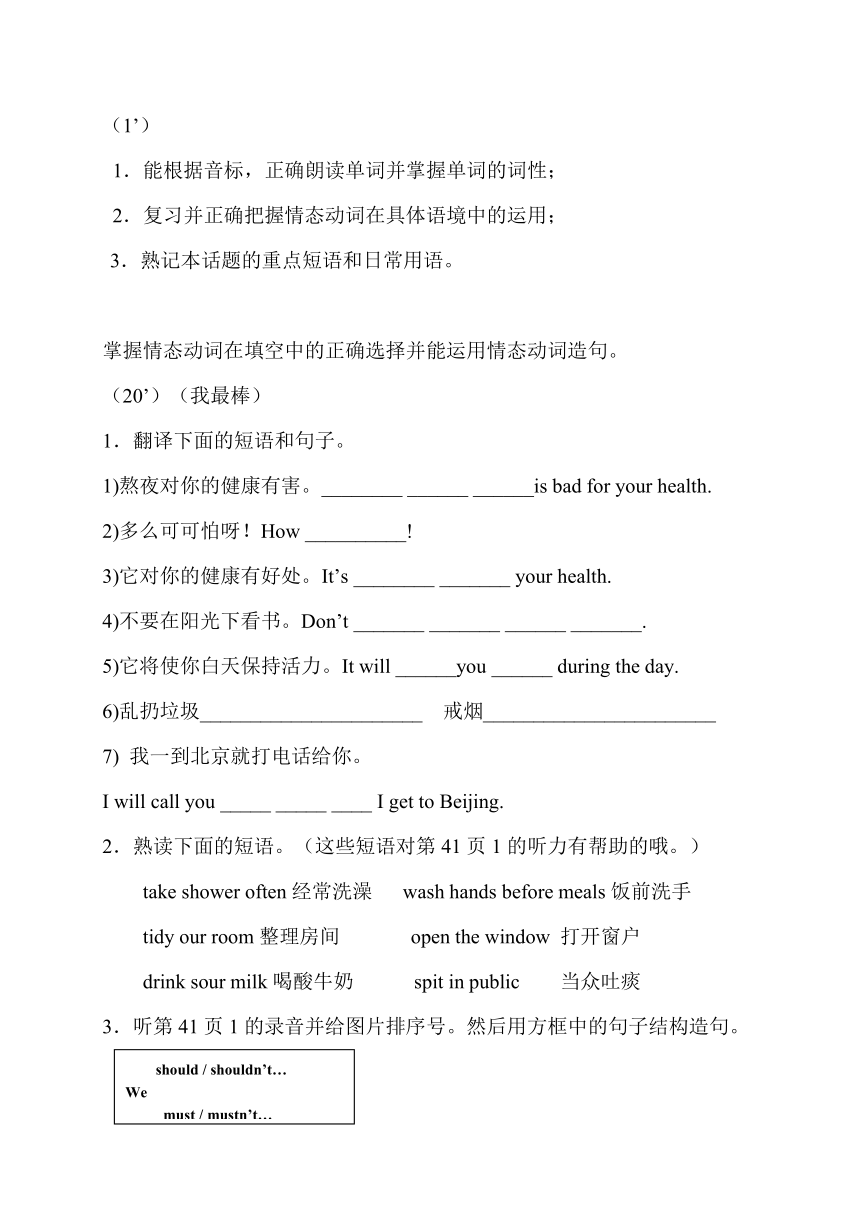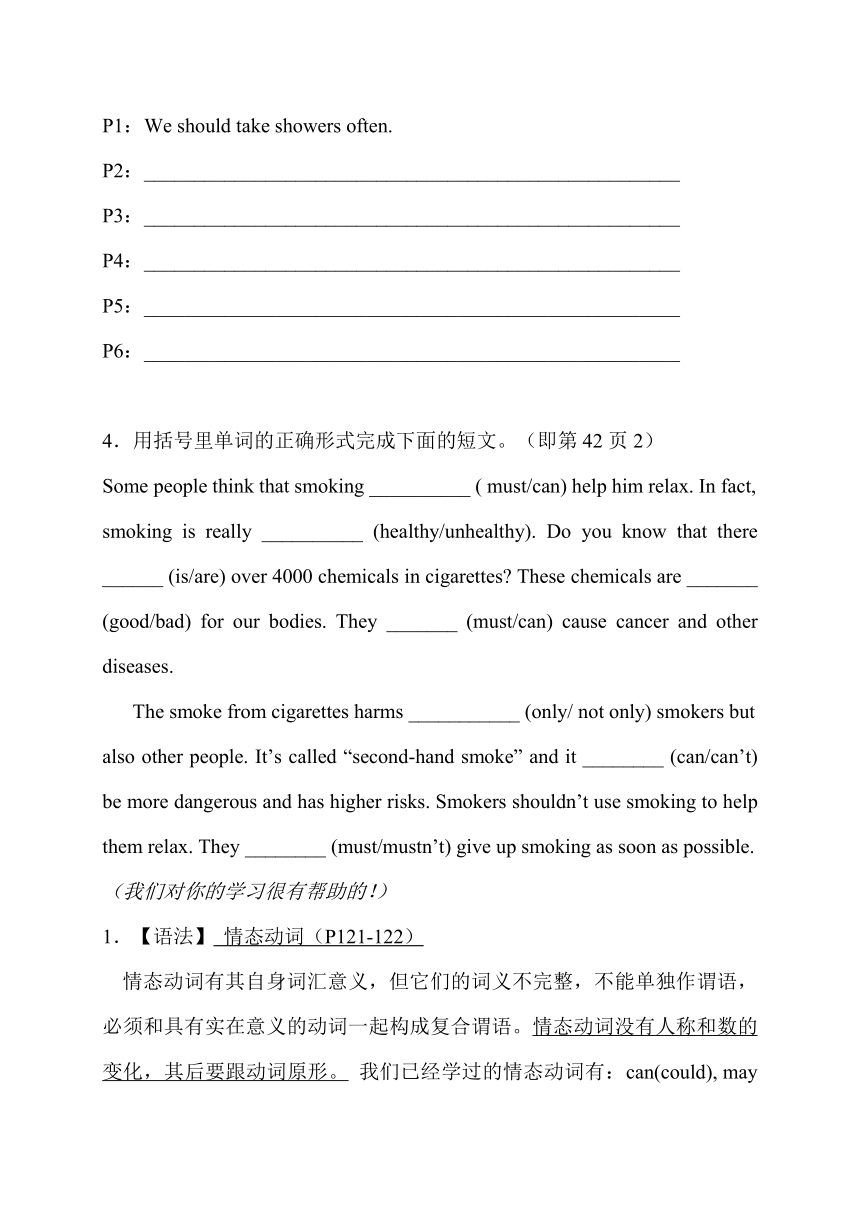Unit 2 Topic 2 I must ask him to give up smoking Section D 导学案
文档属性
| 名称 | Unit 2 Topic 2 I must ask him to give up smoking Section D 导学案 |

|
|
| 格式 | zip | ||
| 文件大小 | 122.3KB | ||
| 资源类型 | 教案 | ||
| 版本资源 | 科普版 | ||
| 科目 | 英语 | ||
| 更新时间 | 2017-07-01 13:01:30 | ||
图片预览



文档简介
Unit
2
Topic
2
I
must
ask
him
to
give
up
smoking
导学案
课型:综合+展示课
Section:
D
(1a-3)
(P41-42)
一课时
Teaching
steps
(教学过程):
(5’)(我会做)
在预习的基础上自主完成下列各题,各组派
C层次的学生上台展示学习成果。(在二次铃时完成,学习组长组织并检查评定)
1.写出下列单词的音标、词性和词意并大声朗读。
音标
词性
词意
1)fact
____________
_______
___________
2)unhealthy
____________
_______
____________
3)chemical
____________
_______
____________
4)cigarette
____________
_______
____________
5)body
____________
_______
____________
6)disease
____________
_______
____________
7)harm
____________
_______
___________
8)smoker
____________
_______
___________
9)risk
____________
_______
____________
10)possible
____________
_______
____________
11)事实上(
)12)二手的,旧的(
)
13)尽量……地(
)
(1’)
1.能根据音标,正确朗读单词并掌握单词的词性;
2.复习并正确把握情态动词在具体语境中的运用;
3.熟记本话题的重点短语和日常用语。
掌握情态动词在填空中的正确选择并能运用情态动词造句。
(20’)(我最棒)
1.翻译下面的短语和句子。
1)熬夜对你的健康有害。________
______
______is
bad
for
your
health.
2)多么可可怕呀!How
__________!
3)它对你的健康有好处。It’s
________
_______
your
health.
4)不要在阳光下看书。Don’t
_______
_______
______
_______.
5)它将使你白天保持活力。It
will
______you
______
during
the
day.
6)乱扔垃圾______________________
戒烟_______________________
7)
我一到北京就打电话给你。
I
will
call
you
_____
_____
____
I
get
to
Beijing.
2.熟读下面的短语。(这些短语对第41页1的听力有帮助的哦。)
take
shower
often经常洗澡
wash
hands
before
meals饭前洗手
tidy
our
room整理房间
open
the
window
打开窗户
drink
sour
milk喝酸牛奶
spit
in
public
当众吐痰
3.听第41页1的录音并给图片排序号。然后用方框中的句子结构造句。
P1:We
should
take
showers
often.
P2:_____________________________________________________
P3:_____________________________________________________
P4:_____________________________________________________
P5:_____________________________________________________
P6:_____________________________________________________
4.用括号里单词的正确形式完成下面的短文。(即第42页2)
Some
people
think
that
smoking
__________
(
must/can)
help
him
relax.
In
fact,
smoking
is
really
__________
(healthy/unhealthy).
Do
you
know
that
there
______
(is/are)
over
4000
chemicals
in
cigarettes
These
chemicals
are
_______
(good/bad)
for
our
bodies.
They
_______
(must/can)
cause
cancer
and
other
diseases.
The
smoke
from
cigarettes
harms
___________
(only/
not
only)
smokers
but
also
other
people.
It’s
called
“second-hand
smoke”
and
it
________
(can/can’t)
be
more
dangerous
and
has
higher
risks.
Smokers
shouldn’t
use
smoking
to
help
them
relax.
They
________
(must/mustn’t)
give
up
smoking
as
soon
as
possible.
(我们对你的学习很有帮助的!)
1.【语法】
情态动词(P121-122)
情态动词有其自身词汇意义,但它们的词义不完整,不能单独作谓语,必须和具有实在意义的动词一起构成复合谓语。情态动词没有人称和数的变化,其后要跟动词原形。
我们已经学过的情态动词有:can(could),
may
(might)
,
need,
must,
have
to
,
shall,
should,
will(would),
had
better(had
better
not).
1)can
表示能力,意为“能,会”。如:
I
can
make
some
model
cars
.我会做一些汽车模型。
b.
表示请求、允许。如:
Can
I
smoke
here
我能在这儿抽烟吗?
c.表示推测,常用于否定句和疑问句。如:
Can
that
man
be
our
teacher
No,
he
can’t
be
.
2)could
a.
can
的过去式,意为“能,会”,表示过去的推测。如:
He
could
write
poems
when
he
was
ten
.他十岁时就会写诗
。
表示委婉的请求。如:
Could
you
do
me
a
favor
你能帮我一个忙吗?
3)may
表示请求,多用于肯定句和疑问句。否定句用mustn’t
,/can’t
回答。如:----May
I
park
here
我可以再这儿停车吗?
----No,
you
mustn’t.
/
No,
you
can’t
.
表示推测,常用于肯定句中,暗含不确定。如:
It
may
be
sunny
latter
on
.一会儿可能天晴。
4)might
a.
may
的过去式,表示可以、可能。如:
He
said
he
might
come
tomorrow
.
他说他明天可能来。
b.表示可能性,可能。如:
He
might
get
in
time
,but
I
can’t
be
sure
.他有可能准时到达那儿,但我不敢肯定。
c.表示有礼貌地提出建议。如:
You
might
try
calling
the
help
desk
.你可以试着给服务台打个电话。
5)must
a.
表示义务,可用于肯定句和疑问句。如:
You
must
look
after
your
sister.
你必须照顾你妹妹。
b.
否定形式表示不许或禁止。如:You
mustn’t
throw
litter
around.
c.表示有把握的推测,用于肯定句。如:The
light
is
on,
so
he
must
be
at
home
now
.
d.
must
的一般疑问句的否定回答用
needn’t
/
don’t
have
to
如:
---Must
we
hand
in
our
exercise
books
today
----Yes,
you
must
.
----
No,
you
needn’t.
/
No,
you
don’t
have
to.
2.Smokers
shouldn’t
use
smoking
to
help
them
relax.
吸烟者不应该用吸烟来放松自己。use
sth.
to
do
sth.
用……去做……
(15’)(我参与)
1.用情态动词:must
/mustn’t
,may
,
can
完成下面的句子。(即41页Grammar)
1)
You
_______throw
litter
around.
2)
He
thinks
smoking
______
help
him
relax.
3)
It________
even
cause
cancer.
4)
I
________ask
him
to
give
up
smoking.
5)_________
I
borrow
your
newspaper
and
show
it
to
my
father
2.用下面的情态动词各造一个句子。
can____________________________________________________________
must___________________________________________________________
should__________________________________________________________
mustn’t_________________________________________________________
(4’)(我能行)
1、记住本节课的单词和词组。
2、整理导学案,梳理本节课所学的知识,检查导学案并完成导学案上所有内容,学习组长注意检查督促。
(5’)(我会做)
1.选择正确答案。
(
)
1)—
Watching
TV
too
much
_______
bad
for
your
eyes.
—
I’ll
go
to
bed
right
away.
A.
is
B.
are
C.
was
D.
be
(
)
2)—
If
you
feel
_______,
you
should
go
to
school.
A.
bad
B.
better
C.
good
(
)
3)—
I
can’t
keep
myself
active
during
the
day.
—
You
_______
take
more
exercise.
A.
must
not
B.
must
be
C.
need
to
D.
may
be
(
)
4)
—You
had
better
ask
your
brother
_______
playing
computer
games.
It’s
bad
for
him.
A.
to
give
up
B.
not
to
give
up
C.
to
give
it
up
D.
not
give
it
up
(
)
5)Children
_______
play
on
the
road
because
it’s
so
dangerous.
mustn’t
B.
can’t
C.
need
not
D.
may
not
(
)6)Don’t
keep
_______
me
such
stupid
(愚蠢的)questions.
A.
to
ask
B.
ask
C.
asking
D.
asked
1、我今天学到了什么知识?
______________________________________________________________
2、这节课我的表现(
)
A、很好
B、好
C、一般D、有待改进
评定等级别______
小组长签名:_________
should
/
shouldn’t…
We
must
/
mustn’t…
2
Topic
2
I
must
ask
him
to
give
up
smoking
导学案
课型:综合+展示课
Section:
D
(1a-3)
(P41-42)
一课时
Teaching
steps
(教学过程):
(5’)(我会做)
在预习的基础上自主完成下列各题,各组派
C层次的学生上台展示学习成果。(在二次铃时完成,学习组长组织并检查评定)
1.写出下列单词的音标、词性和词意并大声朗读。
音标
词性
词意
1)fact
____________
_______
___________
2)unhealthy
____________
_______
____________
3)chemical
____________
_______
____________
4)cigarette
____________
_______
____________
5)body
____________
_______
____________
6)disease
____________
_______
____________
7)harm
____________
_______
___________
8)smoker
____________
_______
___________
9)risk
____________
_______
____________
10)possible
____________
_______
____________
11)事实上(
)12)二手的,旧的(
)
13)尽量……地(
)
(1’)
1.能根据音标,正确朗读单词并掌握单词的词性;
2.复习并正确把握情态动词在具体语境中的运用;
3.熟记本话题的重点短语和日常用语。
掌握情态动词在填空中的正确选择并能运用情态动词造句。
(20’)(我最棒)
1.翻译下面的短语和句子。
1)熬夜对你的健康有害。________
______
______is
bad
for
your
health.
2)多么可可怕呀!How
__________!
3)它对你的健康有好处。It’s
________
_______
your
health.
4)不要在阳光下看书。Don’t
_______
_______
______
_______.
5)它将使你白天保持活力。It
will
______you
______
during
the
day.
6)乱扔垃圾______________________
戒烟_______________________
7)
我一到北京就打电话给你。
I
will
call
you
_____
_____
____
I
get
to
Beijing.
2.熟读下面的短语。(这些短语对第41页1的听力有帮助的哦。)
take
shower
often经常洗澡
wash
hands
before
meals饭前洗手
tidy
our
room整理房间
open
the
window
打开窗户
drink
sour
milk喝酸牛奶
spit
in
public
当众吐痰
3.听第41页1的录音并给图片排序号。然后用方框中的句子结构造句。
P1:We
should
take
showers
often.
P2:_____________________________________________________
P3:_____________________________________________________
P4:_____________________________________________________
P5:_____________________________________________________
P6:_____________________________________________________
4.用括号里单词的正确形式完成下面的短文。(即第42页2)
Some
people
think
that
smoking
__________
(
must/can)
help
him
relax.
In
fact,
smoking
is
really
__________
(healthy/unhealthy).
Do
you
know
that
there
______
(is/are)
over
4000
chemicals
in
cigarettes
These
chemicals
are
_______
(good/bad)
for
our
bodies.
They
_______
(must/can)
cause
cancer
and
other
diseases.
The
smoke
from
cigarettes
harms
___________
(only/
not
only)
smokers
but
also
other
people.
It’s
called
“second-hand
smoke”
and
it
________
(can/can’t)
be
more
dangerous
and
has
higher
risks.
Smokers
shouldn’t
use
smoking
to
help
them
relax.
They
________
(must/mustn’t)
give
up
smoking
as
soon
as
possible.
(我们对你的学习很有帮助的!)
1.【语法】
情态动词(P121-122)
情态动词有其自身词汇意义,但它们的词义不完整,不能单独作谓语,必须和具有实在意义的动词一起构成复合谓语。情态动词没有人称和数的变化,其后要跟动词原形。
我们已经学过的情态动词有:can(could),
may
(might)
,
need,
must,
have
to
,
shall,
should,
will(would),
had
better(had
better
not).
1)can
表示能力,意为“能,会”。如:
I
can
make
some
model
cars
.我会做一些汽车模型。
b.
表示请求、允许。如:
Can
I
smoke
here
我能在这儿抽烟吗?
c.表示推测,常用于否定句和疑问句。如:
Can
that
man
be
our
teacher
No,
he
can’t
be
.
2)could
a.
can
的过去式,意为“能,会”,表示过去的推测。如:
He
could
write
poems
when
he
was
ten
.他十岁时就会写诗
。
表示委婉的请求。如:
Could
you
do
me
a
favor
你能帮我一个忙吗?
3)may
表示请求,多用于肯定句和疑问句。否定句用mustn’t
,/can’t
回答。如:----May
I
park
here
我可以再这儿停车吗?
----No,
you
mustn’t.
/
No,
you
can’t
.
表示推测,常用于肯定句中,暗含不确定。如:
It
may
be
sunny
latter
on
.一会儿可能天晴。
4)might
a.
may
的过去式,表示可以、可能。如:
He
said
he
might
come
tomorrow
.
他说他明天可能来。
b.表示可能性,可能。如:
He
might
get
in
time
,but
I
can’t
be
sure
.他有可能准时到达那儿,但我不敢肯定。
c.表示有礼貌地提出建议。如:
You
might
try
calling
the
help
desk
.你可以试着给服务台打个电话。
5)must
a.
表示义务,可用于肯定句和疑问句。如:
You
must
look
after
your
sister.
你必须照顾你妹妹。
b.
否定形式表示不许或禁止。如:You
mustn’t
throw
litter
around.
c.表示有把握的推测,用于肯定句。如:The
light
is
on,
so
he
must
be
at
home
now
.
d.
must
的一般疑问句的否定回答用
needn’t
/
don’t
have
to
如:
---Must
we
hand
in
our
exercise
books
today
----Yes,
you
must
.
----
No,
you
needn’t.
/
No,
you
don’t
have
to.
2.Smokers
shouldn’t
use
smoking
to
help
them
relax.
吸烟者不应该用吸烟来放松自己。use
sth.
to
do
sth.
用……去做……
(15’)(我参与)
1.用情态动词:must
/mustn’t
,may
,
can
完成下面的句子。(即41页Grammar)
1)
You
_______throw
litter
around.
2)
He
thinks
smoking
______
help
him
relax.
3)
It________
even
cause
cancer.
4)
I
________ask
him
to
give
up
smoking.
5)_________
I
borrow
your
newspaper
and
show
it
to
my
father
2.用下面的情态动词各造一个句子。
can____________________________________________________________
must___________________________________________________________
should__________________________________________________________
mustn’t_________________________________________________________
(4’)(我能行)
1、记住本节课的单词和词组。
2、整理导学案,梳理本节课所学的知识,检查导学案并完成导学案上所有内容,学习组长注意检查督促。
(5’)(我会做)
1.选择正确答案。
(
)
1)—
Watching
TV
too
much
_______
bad
for
your
eyes.
—
I’ll
go
to
bed
right
away.
A.
is
B.
are
C.
was
D.
be
(
)
2)—
If
you
feel
_______,
you
should
go
to
school.
A.
bad
B.
better
C.
good
(
)
3)—
I
can’t
keep
myself
active
during
the
day.
—
You
_______
take
more
exercise.
A.
must
not
B.
must
be
C.
need
to
D.
may
be
(
)
4)
—You
had
better
ask
your
brother
_______
playing
computer
games.
It’s
bad
for
him.
A.
to
give
up
B.
not
to
give
up
C.
to
give
it
up
D.
not
give
it
up
(
)
5)Children
_______
play
on
the
road
because
it’s
so
dangerous.
mustn’t
B.
can’t
C.
need
not
D.
may
not
(
)6)Don’t
keep
_______
me
such
stupid
(愚蠢的)questions.
A.
to
ask
B.
ask
C.
asking
D.
asked
1、我今天学到了什么知识?
______________________________________________________________
2、这节课我的表现(
)
A、很好
B、好
C、一般D、有待改进
评定等级别______
小组长签名:_________
should
/
shouldn’t…
We
must
/
mustn’t…
同课章节目录
- Unit 1 Playing Sports
- Topic 1 I'm going to play basketball.
- Topic 2 I'll kick you the ball again.
- Topic 3 The school sports meet is coming.
- Unit 2 Keeping Healthy
- Topic 1 You should brush your teeth twice a day.
- Topic 2 I must ask him to give up smoking.
- Topic 3 Must we exercise to prevent the flu?
- Unit 3 Our Hobbies
- Topic 1 What's your hobby?
- Topic 2 What sweet music!
- Topic 3 What were you doing at this time yesterday
- Unit 4 Our World
- Topic 1 What's the strongest animal on the farm?
- Topic 2 How can we protect ourselves from the eart
- Topic 3 The Internet makes the world smaller.
